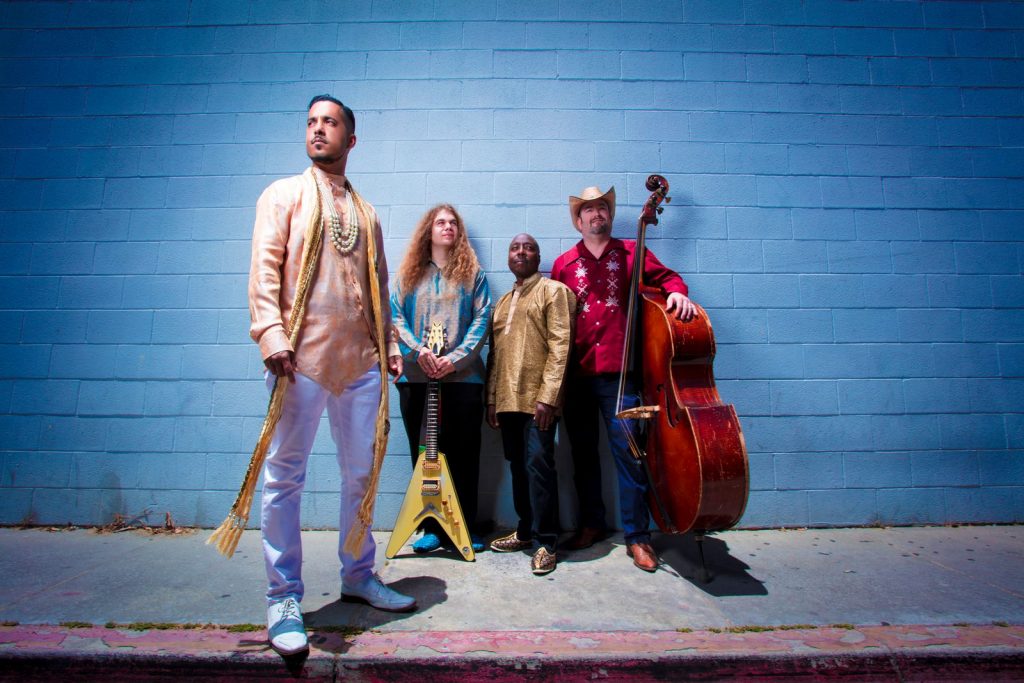For the past decade, the India-born vocalist and harmonica player Akarsha “Aki” Kumar has left an increasingly larger imprint on the blues world and the harmonica community. Kumar learned to play at David Barrett’s famous School Of The Blues in San Jose, California and then started to gig regularly in the Bay Area, eventually forming the band Tip Of The Top.
After that band dissolved, he continued to perform and recently had his most significant breakthrough with his one-of-a-kind fusion of Bollywood music and blues and critically praised album Aki Goes To Bollywood. One of the things that has fueled Kumar’s success is his harmonica playing, particularly his grasp of tone and phrasing – no doubt learned in part from his work with Barrett and playing with Bay Area legend Gary Smith. Kumar talked to us about working to build tone and how you can achieve your best possible tone on the instrument and the virtue of patience.
What was the first thing you heard on the harmonica that grabbed you?
I remember hearing John Mayall’s version of (Room To Move).
This was before I knew anything about blues or blues harmonica. I remember the percussive nature of it was so cool. To my ears, that fat acoustic harp and the way he drove that song solo like a one-person army moved me. I loved that feeling. My first blues concert was Mark Hummel. It’s one of the first times I heard very traditional playing. He was playing first position, and I remember the feeling. What always moved me is a feeling or sound that got me. There wasn’t a single moment. I just fell in love with various elements.
Do you think you have always listened to music for tone?
I think all of us do and aren’t even aware of it. Tone is what dictates how we hear music perhaps more than other respects. In blues, tone is king – that fatness of sound. My first primary goal is to try to get the best, most appropriate tone to the sound I want to deliver. The appropriate tone is what I listen for, too.
If you listen to Jimmy Reed, I don’t think you’d describe that as fat tone. But that raspy quality is what works.
Rice Miller has a raspiness to how he plays, too. When he plays one draw, he has this raspy tone, and I’ve been chasing that sound. And you can’t get that if you play a full, amplified sound. So raspiness is part of the beauty of what these players did.
When you took up the instrument seriously was it frustrating to not get the sounds and tones you heard? Take me through those first steps.
Well, I’d been attempting to play even before I went to David (Barrett). I could bend specific notes on certain harmonicas. But I had no idea of the physics of it or that the tongue was involved. I was trying to position my lips on the harmonica, and maybe accidentally my tongue would end up on it. So what I did was play some licks, and then I would miss the bends in the lick. Then I could hit the bend, but it didn’t sound as full as the other notes.

I had some misconceptions about the instrument and thought there were limitations to it. When I went to David, he resolved a lot of it. He’s very clever about showing you your strengths and weaknesses without telling you. He asked me to play a D harmonica. I was getting single notes. He gave me a G harmonica and then all of a sudden I flamed out. I always just assumed it was a bad harmonica (laughs). I played it and handed it to him and said it wasn’t a good harp.
That’s an eye-opening thing right there… each key harmonica needs something different to get the best tone.
Yes, and even now I need to go back and practice on high-key harps to make sure I don’t lose the muscle memory,
What was your process to not just develop tone but learn what you needed to go out and play in public?
I was very humble about the process. I think at the start I realized that I didn’t know much and here is a guy (Barrett) that knows a lot more than I do. I tried to focus my attention and thought maybe over 20 years I might be able to get good. I thought I’d be happy if I could play Little Walter’s Juke by the time I was 40.
So I’d say it was a slow and cautious approach. I gave myself a lot of time to learn small things. There were these three notes in the hook of Juke that, whenever I was tongue blocking, I’d hit them too hard and the harp would choke. You wouldn’t imagine how long it took me to get that right. I think one of the best things I did was give myself time to come to terms with my abilities and shortcomings. But I was disciplined, and I practiced every single day, even if it was only 15 minutes. I remember, as a result, that I started breaking some boundaries. That was just the result of diligent practice.
In forums and on social media you hear from a lot of people who are frustrated when they aren’t great in six months. But ultimately isn’t the process about time and discipline? You have to look at this long term.
If you can get good at something in six months, it’s probably not that complicated. Playing a musical instrument with virtuosity, no matter what instrument, takes time. If getting good fast is your expectation, you should probably reassess your goals. But we live in the culture of constant gratification. Everyone is eager to learn quickly. I think a little self-compassion is a good thing. Give yourself room to learn and grow. Whether you have a long term goal or not, it all comes down to your love of music and allowing that to flourish. If you set reasonable, small, incremental goals and give yourself the time to learn, you can attain mastery.
The upside of the Internet is that everything is available. The downside is that everything is available. If you see someone playing amazing material, it can make what you are trying to achieve seem impossible.
I agree with that. When I started, YouTube was there, but Ronnie Shellist was the only guy putting videos out. The world of many players putting out videos did not exist – you had to go out of your way to find harmonica videos. Whenever I would come across truly incredible playing on the Internet, I remember telling someone I would never do this and it made me really sad (laughs).
When you finally gained some competence on the instrument, how did you go about improving your tone?
David always emphasized that you have to be relaxed, and I ignored it. Later, I kept asking myself “am I relaxed?” Over time, I noticed that my shoulders were hunched up. I tried to loosen up. I also focused on using my diaphragm as much as I could. If you’re a good player, that’s something you should be doing. The real thing was tongue blocking. I remember I was trying to copy some Gary Smith licks and the moment I switched to tongue blocking it started to sound right. The more I tongue blocked, the more I realized my amplified tone sounded better. David always said part of that better tone was having more of the harmonica in your mouth. I didn’t understand what he meant until I was able to do it.
Do you tongue block one hundred percent?
Yes, I don’t ever play puckered anymore.
I notice when I play with a mic that if I switch from tongue block to pucker it doesn’t sound the same. You can make it sound very good or great, but it’s still not as fat of a sound.
Here’s the thing. David Barrett switched fully to tongue blocking around the time he was teaching me to do it. He’s the guy who got me to do it. I remember his tone before he tongue blocked all the time and his pucker tone was incredible. You can get incredible tone puckered – I think that is possible. But I find it harder to shape. I’ve tried for years and then just finally stopped playing puckered. I had to spend at least six months learning to play the one draw with a tongue block, and it screwed up my playing for a while. But I stuck with it because I wanted that extra ten percent.
David Barrett’s exclusive lessons on the 3 main tongue-blocking techniques used by blues harmonica players are included as a bonus in the: Breakthrough Blues Harmonica Course.
There is a clip of my live playing where I think I sound my best.
I tried to figure out why I liked it so much and realized it was almost one hundred percent tongue blocked. I think a tongue block can encourage you to play rhythmically, to use slaps and effects, to use octaves… all the stuff that makes the instrument sound big. I think good, amplified tone starts with good acoustic tone.
If you can’t generate a great acoustic tone, you can’t create great amplified tone. You can probably get something out of the amplifier. But you can do better when you start with good tone.
So should newer players ready to buy expensive equipment worry about good acoustic tone first?
Yes. When you are starting, you don’t know much and don’t have the experience. You end up trying everything. I spent hundreds of dollars on stuff because I was trying to compensate for what I hadn’t achieved. At this stage of my playing, I have no use for most of that stuff. That’s not to say you shouldn’t have a good mic or a good amp. And there are those players like Jason Ricci who think outside of the box with pedals and sounds.
If you are a newer player who wants to develop great tone, what are your suggestions?
Focus on extracting the most out of each note you play. For a while, you might have to forget about fast playing. Once you can master getting the most out of one note, you can start to build some speed and play with good tone. I remember every time I tried to play fast I would lose some tone. I’ve had to suppress that tendency. And like I mentioned, you have to relax. That will also help with longevity. That will allow you to play with good tone, not just for five minutes but five hours. It’s also good to work on the lower-keyed harmonicas, even the Low F, to build tone on the low notes. It’s almost like cardio exercise. You can get sore working those lower harmonicas! There are times I have to put the harmonica away.
On the amplified front, I can’t tell you what gear to use, but I can tell you to try to dial in what you are doing acoustically. Then focus on your grip and cup, very slowly. I’ve built up some bad habits from gigging. It’s a constant work in progress. Give yourself time.
For more about Aki visit the Aki Kumar official website.


Comments
Got something to say? Post a comment below.